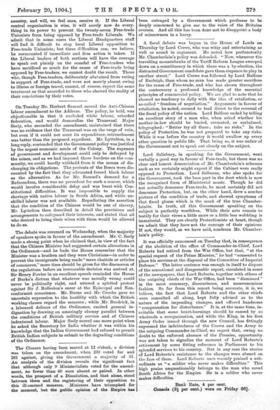It was officially announced on Tuesday that, in consequence of
the abolition of the office of Commander-in-Chief, Lord Roberts had retired from the War Office, but that, "at the special request of the Prime Minister," he had "consented to place his services at the disposal of the Committee of Imperial Defence." The latter sentence was enough in itself to dispose of the sensational and disagreeable report, circulated in some of the newspapers, that Lord Roberts, together with others of the outgoing chiefs of the War Office, had been " dismissed" in the most summary, discourteous, and unceremonious fashion. So far from this report being accurate, it is, we believe, the fact that Lord Roberts and the other chiefs were consulted all along, kept fully advised as to the nature of the impending changes, and offered handsome " compensation for disturbance." It is, at the same time, in- evitable that some heart-burnings should be caused by so wholesale a reorganisation, and while the King, in his first Army Order issued through the new Council, has fittingly expressed the indebtedness of the Crown and the Army to the outgoing Commander-in-Chief, we regret that, owing no doubt to the enforced absence of the Premier, opportunity was not taken to signalise the moment of Lord Roberts's retirement by some fitting reference in Parliament to his splendid services to his country. But in any case the stories of Lord Roberts's resistance to the changes were absurd on the face of them. Lord Roberts once warmly praised a sub- ordinate as " a soldier who never makes difficulties." This high praise unquestionably belongs to the man who saved South Africa for the Empire. He is a soldier who never makes difficulties.










































 Previous page
Previous page